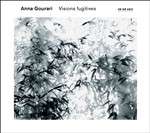|
Back
12/10/2014
“Visions fugitives”
Sergey Prokofiev: Visions fugitives, opus 17
Nicolai Medtner: Fairy Tale in F minor, Opus 26, N° 3
Frédéric Chopin: Sonata N° 3 in B minor, Opus 58
Anna Gourari (piano)
Recording: Historischer Reitstadel, Neumarkt, Dresden, Germany (October, 2013) – 63’
ECM New Series 2384 – Booklet in German and English

   
Russian-born pianist Anna Gourari, now in her early forties, has been gaining in kudos since moving to Germany in 1990. Her most recent CD for ECM is an impressive disc by any standards. Gourari possesses a virtuoso technique in the grand Russian tradition and brings an idiosyncratic approach to the music, relishing lyricism, inner voicing, rhythmic breadth, and an extravagant range of sonority and dynamics.
Pianists from the past, including Richter and Rubinstein during the 1960s, have performed and recorded their own selections from Prokofiev’s Visions fugitives; however, few have presented the complete set, as Gourari does. The result is consistently compelling as well as sensuous, offering a wealth of detail and insight which can be described only as masterful. Composed between 1915 and 1917, the height of World War I and the Russian Revolution, Visions fugitives were a kind of shorthand for the composer’s fleeting perceptions of fellow human beings during a time of horrifying chaos. The pieces themselves (several, less than a minute in length) appear to reflect escape and brief moments of ephemeral, observational humour or incident rather than direct, pained response to trauma. Hearing the entire set in such a fine performance is an experience of genuine gravitas. The Visions’ more gossamer aspects communicate more commonly when only a few are heard, or done as encores.
Medtner’s Fairy Tale is a short, more traditionally romantic salon piece from 1912, which Gourari plays with appropriate affection. If we think of this disc as a kind of mini-recital (a term Vladimir Horowitz used for his early Columbia recordings some fifty years ago), the Medtner also serves to take listeners back a few decades for the CD’s final large work, the Chopin Sonata N° 3 in B minor.
Composed in 1844, the Sonata ushered in the summit of Chopin’s final, larger-scale works, a category which would also encompass the ravishingly elaborate Barcarolle, the epic Polonaise-Fantaisie and the Sonata for Piano and Cello, his final published work. These are works which truly come alive only in the hands of a master performer and Gourari’s reading, again, is indeed masterful. She is in total command of the work’s complexity on all levels.
The first movement’s opening flourish is neither rushed nor slow (both being common miscalculations from less scrupulous performers who don’t always heed the directive, Allegro Maestoso, not merely Allegro.) Gourari does have a tendency to rush (slightly) the beginning of a new phrase which might be disconcerting to some; however, she does this with complete consistency so that even the most discerning listeners should soon adapt. She plays the exposition repeat in the first movement, bringing greater breadth and stature to the work, while the elaborate counterpoint and other intricacies of the development section are handled with ease.
She pauses more than a few moments when the first movement ends, then smoothly (there’s nothing abrupt or rushed here) launches into the second movement’s “Scherzo” with its teasing, glittering runs; the mid-section is a bit slower than usual, becoming a premonition for the monumental, meditative third movement, “Largo”, which Gourari begins as soon as the “Scherzo” finishes. It is small, insightful touches like this which, as well as the artist’s superb pianism and musicianship, unify the performance and roundly dismiss pundits who might still claim Chopin’s Sonatas “don’t really hang together.” (It was Robert Schumann, otherwise among Chopin’s earliest and most dedicated admirers, who first posited this intellectual canard.)
By any standards, this CD by Anna Gourari is a magnificent recording.
Charles Pope Jr.
|